Weaning your baby onto solid foods is an exciting milestone for any family, but there’s no denying it can often be a confusing – or even daunting – process for many parents. The introduction of new flavours, colours and textures into a baby’s diet can result in some pretty mixed responses. Indeed, in a recent study that Piccolo organic baby food conducted amongst parents, it was revealed that a fifth (20%) of parents still find weaning stressful and over half (53%) completely misread babies’ facial expressions when trying solids for the first time*.
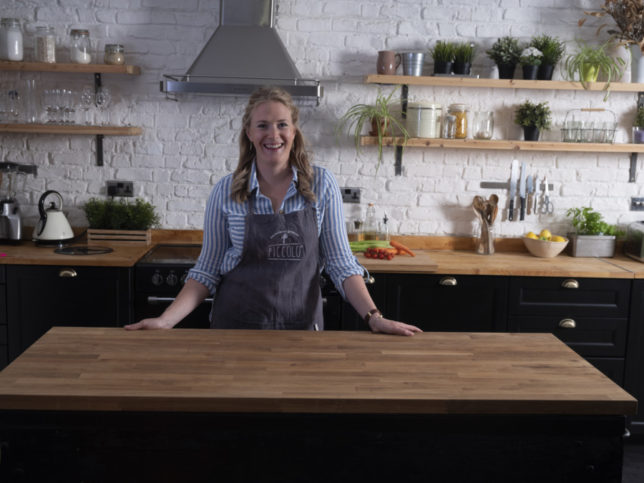
Alice Fotheringham, head of nutrition at Piccolo organic baby foods and a firm believer that, while the weaning process differs from family-to-family, it should always be a fun-filled experience and journey of discovery. Alice says: “I always try to encourage parents to take a more relaxed approach to weaning by avoiding getting too hung up on what other people are doing or what the rulebooks might say. Listen to your baby, because believe it or not, they’re actually much more intuitive when it comes to eating than the average adult. And don’t be put off by the weird and wonderful faces they might pull – this is all part of the process of them getting to grips with something totally new.”

So how can you tell what your baby is really thinking, especially when their facial expressions might suggest they are less than impressed…
To help perplexed parents, Alice recently teamed up with baby psychologist Caspar Addyman to help decipher what babies are really trying to say through their facial expression.
Only time will tell
This advice might be frustrating but it’s also true. Naturally, most parents hate seeing their child distressed so there is a tendency to give up on new foods if your baby pulls what you perceive to be an unhappy face. However, it can take up to 12 tries for a baby to get used to a new food, and repeated exposure is imperative to getting them accustomed to unusual flavours and textures. So don’t be discouraged if your baby doesn’t seem receptive to a new taste at first – it’s not a reflection of your cooking!

Dislike or confusion?
It can often be difficult to distinguish between dislike and confusion with infants, but as a general rule try not to assume the former. As mentioned, it takes babies longer than adults to become accustomed to certain new tastes and consistencies, so they are likely to react with facial expressions that you identify as dislike for a while. Key facial expressions of confusion that are often mistaken for disgust are wrinkling their nose, lowering the brow, and squinting. This is much more likely to be your baby trying to convey uncertainty, rather than turning their nose up at what’s for dinner.

Flavour faces
Some flavours elicit quite recognisable reactions from babies that may not differ that much from our own, as adults. Bitter tastes may result in your baby gaping their mouth: again, this does not necessarily denote to dislike. Your baby may just be puzzled by this unique flavour!

Sweet or savoury receive generally the most positive response from babies, possibly because breast or formula milk has both of these flavours. Sour flavours, in fact, produce the same facial expression in babies that they do in adults: think pursed lips (and maybe slight shock). Don’t force this food but equally don’t interpret it as immediate dislike.

Not my cup of tea
It isn’t hard to tell when your baby is trying to show a strong aversion to a meal. Their body language says it all, and they are likely to turn away and pull back from the food that you’re trying to feed them. Unfortunately, this means that they don’t love this meal and it is best not to try and make them finish it. That being said, it’s more important to make sure that your baby is eating a balanced diet with all of the right nutrients, so don’t let their dislike for certain foods interfere with this. Do green vegetables spring to mind for anyone else?
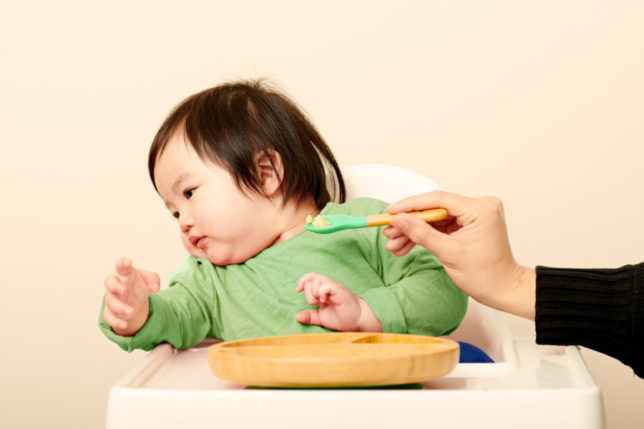
Yes, yes, yes!
Just as it’s obvious when your baby firmly dislikes a food, it is no secret when a food is right up their street. If they are lunging towards food with an open mouth, you can safely say that they love this meal and can’t get enough of it! Make sure you note that recipe down for future reference.
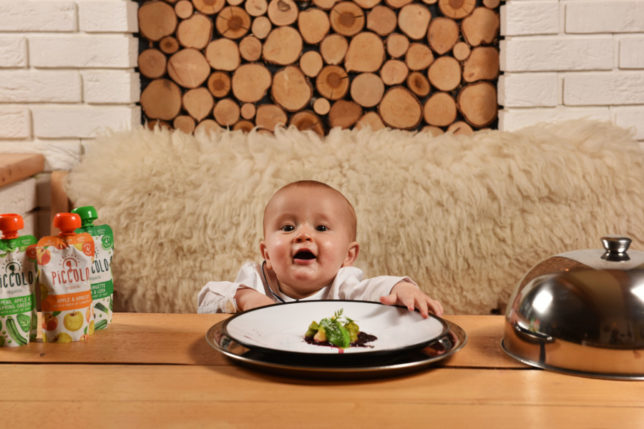
For more information, visit www.mylittlepiccolo.com
*Survey of 500 parents of children under the age of five was conducted by onepoll (12 April 2019)
Royal Weaning Recipes from Chef Damian Wawrzyniak
As Archie Windsor reaches his six month milestone this November, he’ll be preparing to embark on his own weaning journey. To help inspire Harry and Meghan, as well as parents up and down the country, Piccolo teamed up with former royal chef Damian Wawrzyniak to create two royally-approved weaning recipes fit for any little Prince or Princess. They were personally taste-tested by two aptly-named food critics, Archie (13 months) and Harry (8 months), who visited Damian’s restaurant House of Feasts in Peterborough.
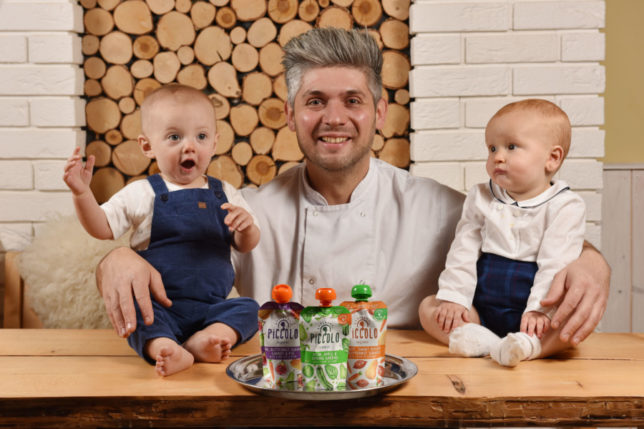
Plant-based puree (6 months +)
Alice and Damian developed this recipe, suitable for babies aged six months and above, amidst rumours that Meghan Markle favours a plant-based diet. Combine blended peas, blanched cauliflower, roasted carrots, and a hint of sweet potato. Ensure that the peas are fully reduced to remove all skins, which can be challenging for young infants to digest. Finish off the dish with a drizzle of olive oil to incorporate some healthy fats into your baby’s diet.
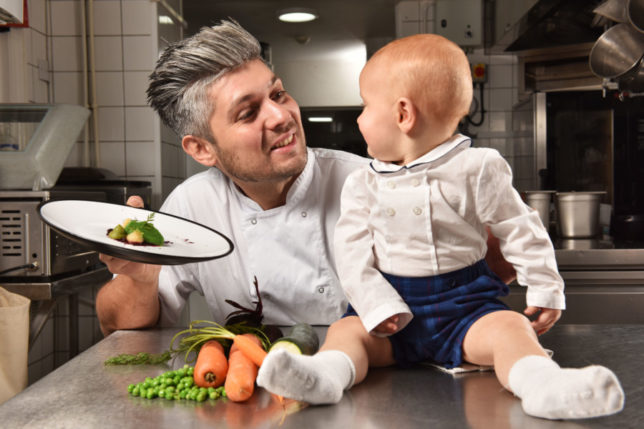
Roast chicken dinner (12 months +)
This recipe is a twist on the classic roast chicken dinner: a personal favourite of Harry and Meghan’s, which they were famously preparing when the Duke of Sussex proposed. Suitable for infants who are more familiar with solid foods, this recipe features a variety of flavours and consistencies. Bite-sized chicken breast chunks and small crisps of chicken skin are accompanied by beetroot, onions, and pickles to create this regal, balanced meal, packed full of nutrients and textures.
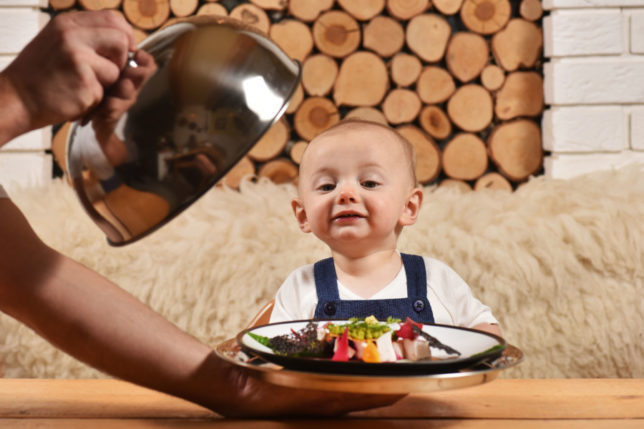
About the expert
Alice Fotheringham is Piccolo’s resident infant nutrition specialist, who has spent years honing her skills in recipe writing and development. Along with Piccolo founder Cat Gazzoli, they developed the programmes for the Food Education Foundation and they work alongside the NCT on weaning workshops.
Launched in 2016, Piccolo is the UK’s largest premium baby food company, on a mission to Inspire Little Adventures through food and family time spent together.
Drawing from founder Cat Gazzoli’s Mediterranean roots, Piccolo makes organic baby food, snacks and cooking ingredients packed with vegetables, fruit, herbs and spices to make it easy for parents to give their families a nutritious start in life and promote a lifetime of healthy eating.
The Piccolo range is developed by co-founder and infant nutritional expert Alice Fotheringham – and spans smooth purees suitable from 4 months, textured meals suitable from 7 months, teething snacks and cooking sauces & stock cubes – enabling parents to relax and enjoy time together with their growing families.
Piccolo are also committed to giving 10% of profits to support local families, and have donated over 200,000 baby meals to families in need over the last 2 years via partnerships with charities such as British Red Cross and Trussell Trust. Piccolo are based in Central London with a projected turnover in excess of £5 million this year. Piccolo can be found in Tesco, Sainsbury’s, Waitrose, Asda, Coop, Boots, Morrisons, Ocado, Whole Foods Market and Planet Organic as well as many independent and online retailers.

